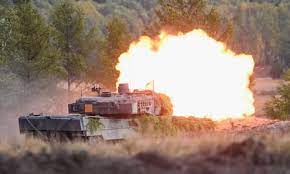Why are European defence leaders talking about war?

Intractable combat in Ukraine and Middle East has planners fearing the worst, but a returning President Trump would add to the volatility
A wave of anxiety has gripped European defence ministers and armed forces as politicians and military leaders believe that Nato-sceptic Donald Trump could be elected as the next president of the US – and that Russia may not be forced out or defeated in Ukraine. This febrile mood has prompted growing warnings that Europe could find itself involved in a war in Russia, even though at present Russia is embroiled in Ukraine.
At the same time, tensions in the Middle East have continued to rise. Israel’s assault on Gaza continues; hostilities with Iran-aligned Hezbollah in Lebanon increase; and the US and the UK launched bombing raids on Houthi-controlled areas in Yemen to halt raids on shipping in the Red Sea.
What are politicians and generals saying?
Adm Rob Bauer, the chair of Nato’s military committee, said last week that it was “not a given that we are in peace” and that was “why we are preparing for a conflict with Russia and the terror groups if it comes to it” before the start of what the military alliance said was its largest exercise in decades, involving 90,000 troops.
Grant Shapps, the British defence secretary, used even stronger language, arguing the cold war peace dividend was over and that the UK and its allies were “moving from a postwar to a prewar world” with idealism replaced by “hard-headed realism”. It was time, he argued, for re-armament to protect Europe from “Putin’s fury”.
Boris Pistorius, the German defence minister, gave an interview last week suggesting that while a Russian attack was not likely for now “our experts expect a period of five to eight years in which this could be possible”. Europe, he added, was “dealing with a military threat situation … that has not existed for 30 years”.
Norway and Sweden have also made similar warnings in the past month.
Isn’t this just scaremongering by militaries wanting more money?
Planning for warfare, a remote contingency, is what militaries do and there is always pressure from generals and defence ministries to spend more. But the war in Ukraine – which will have run for two years next month – is exhausting western stockpiles of munitions.
It looks increasingly likely, meanwhile, that the US Congress will not vote through a new $61bn (£48bn) military aid package for Ukraine as Republicans ratchet up the pressure over a quid-pro-quo deal to boost security on the US southern border.
A wave of western weapons given so far to Ukraine, including German Leopard 2 and British Challenger 2 tanks; US Bradley fighting vehicles; American, British and French long-range rocket artillery, as well as ammunition and artillery shells have failed to make a dent in the Russian frontlines – and, if future US military aid were to halt as a result of the deadlock in Congress, Europe would struggle to make up the gap.
Experts fear that without the US, Russia could gradually turn the tables.

